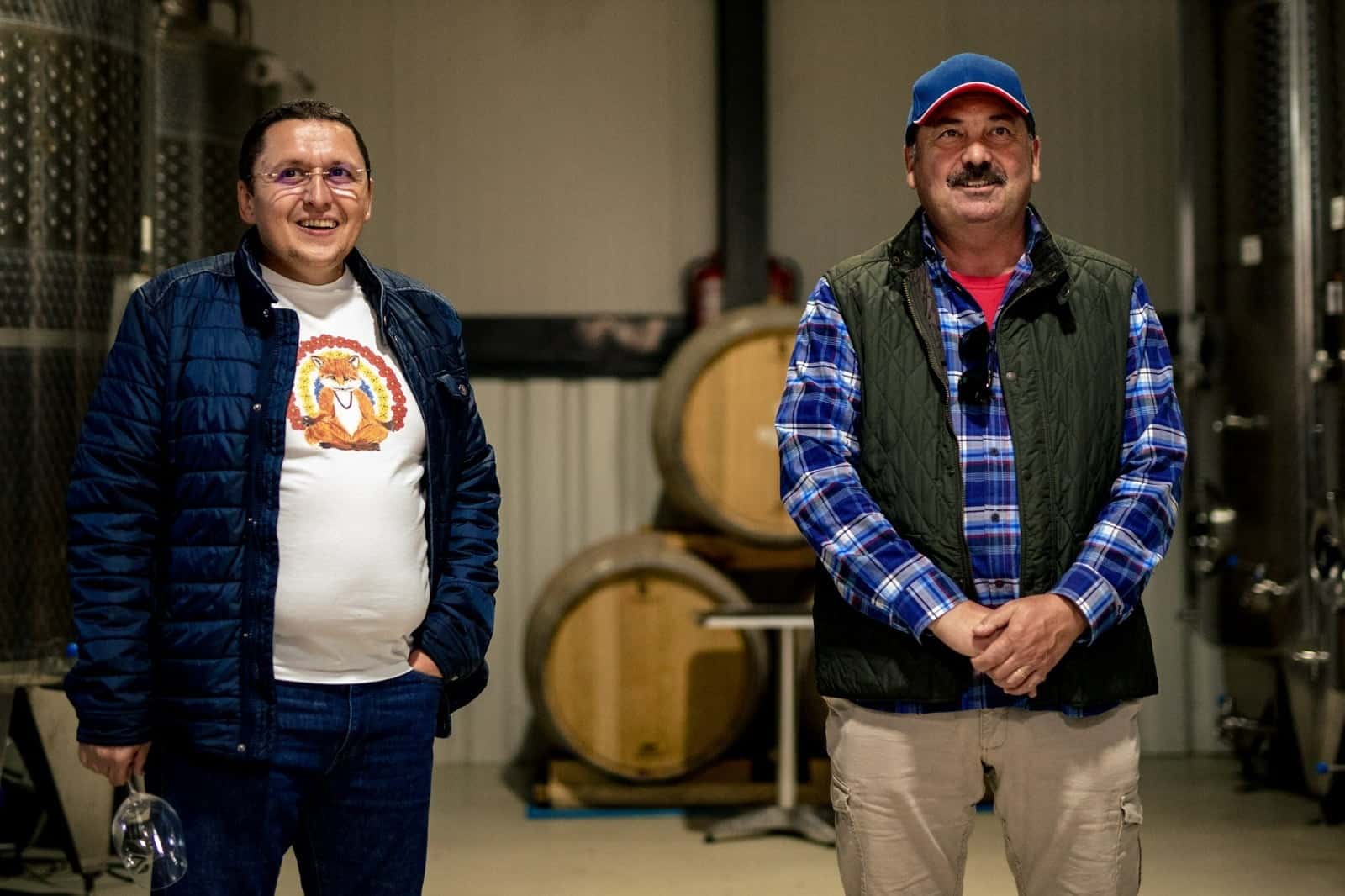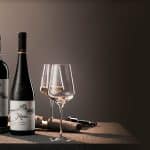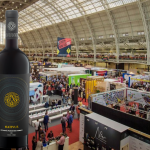Marcel Pascu si Marcel Vulpoi - proprietarii cramei Gramofon
You say Marcel Vulpoi, co-owner of Gramofon Wine, in the WoR podcast, in a recent webinar, you can often see him in TV interviews or read about him in online articles, but his partner, who founded the winery, Marcel Pascu, has long flown under the radar and there’s not much known about him. So we decided to remedy this and invited him to "a tea and a conversation", the wine not being taken into account because we met him on his way to rehearsals at the National Radio Hall. How you become a wine man from being a musician, how wine changes you and what it means to work in the vineyard and in the winery, in this exclusive interview:
Myth busted: Children don’t drink wine in Dealu Mare
Wines of Romania: Your personal story starts here, close to the winery, right?
Marcel Pascu: I’m from here, from this region, less than 20 kilometers away, my mother was an accountant at teh state farm here and ever since I took my first steps, of course I was in the fields all day. And the atmosphere of life in the country got stuck in the back of my mind. So, after I traveled Italy from north to south for more than nine years on tours – I got to know Italy better than I did Romania – and then I also traveled the world, I went around it twice, I was from the Northern polar circle to the Southern polar circle, through the East and the West, I wanted to return to my roots.
WoR: Out of curiosity: is it true that the water in Dealu Mare is so chalky that children drink wine?
M.P.: Fortunately, no, and it wouldn’t be good either. There are stories, but it is good to keep wine away from children, even teenagers, to leave it at least for the first youth…
WoR: Back to the beginning – how did you get into playing the saxophone, into music in general? Was there a song, a band that inspired you?
Marcel Pascu: I always liked music, I was told from kindergarten that I had a feel for it. First it was the violin, in the third or fourth grade, under the guidance of my teacher. She was the one who talked to my father and told him that he should let me pursue a musical career. That’s how I got to take the exam in the fifth grade and into the music school in Ploiesti. Unfortunately, when I reached the eighth grade, as it was in those days, with the bankrupt Communist festivals, the music high school in Ploiesti was closed and it was replaced by a separate, somewhat non-functional department within the pedagogical high school. I had an older colleague who had enrolled at the Military Music High School in Bucharest, a model that I followed along with three colleagues – four of the six boys in our class – and we won, three of us. After high school, I remained in the Army Representative Ensemble, as a clarinetist, until 1989. I was hoping that things would somehow change after the Revolution, but the inertia of the Army… So I applied to get discharged and in 1992 I got a contract in Italy, with a band of Romanian musicians. Then I kept flying between Italy and the country – I left immediately after I got married, for about 7-8 months, I came back and had the wedding, I left again, I came back and baptized my first kid…
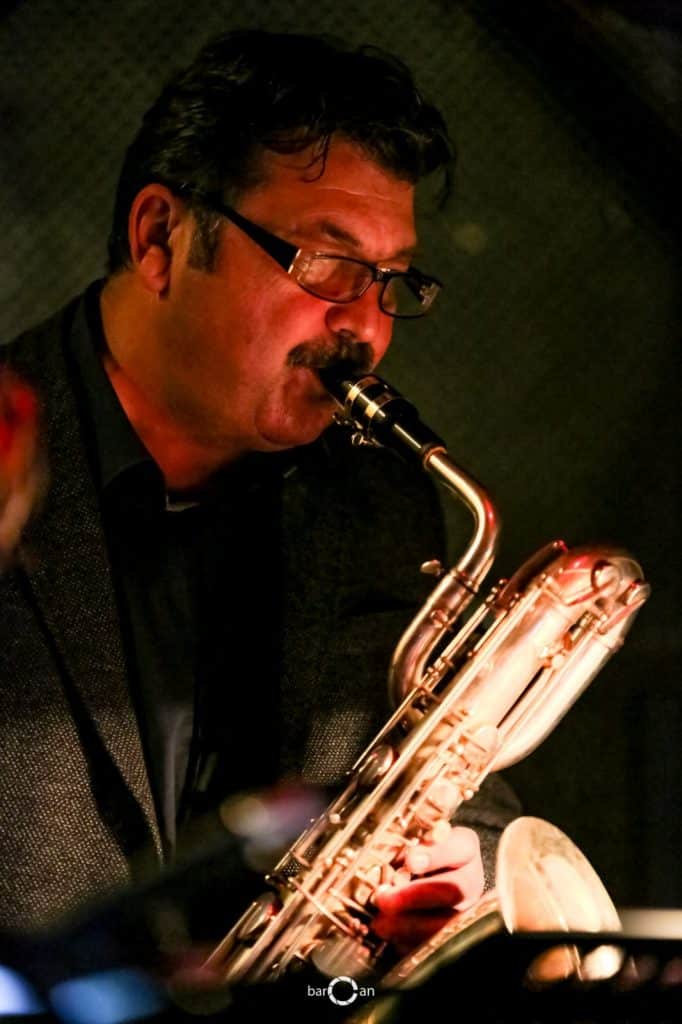
The birth of Gramophone Wine
WoR: So you sing jazz mostly?
M.P.: Not only that. There was also a lot of bandstand music, I also had a collaboration for circus music, another for show music, a lot of accompanying music… But circus music is something special, just like circus life, there are many special people there, who really are like a family, it’s also the life of a nomad, moving from one city to the next… When the contract in Italy ended and I wanted to stay more at home, I got a contract on a cruise ship, but much more relaxed, I could stay on the ship for a month, a month and a half, then return to the country for a month or a month and a half. The most I stayed on the ship was four months, when I left Genoa, circled the Earth and returned to Venice. In total, I stayed on the ship for about three years, but it was becoming necessary to stay at home as well, the children had grown up, the eldest was starting school… My wife had a rather demanding job, and I really wanted to take care of them more. And, after I came back, because I didn’t really feel like staying in Bucharest on Saturdays and Sundays, I started going home, it’s also close to Bucharest… I wanted to build a house next to my parents’ house, I bought a piece of land there, but for reasons beyond my control, I never got around to building anything there.
WoR: And Dealu Mare was close…
M.P.: Exactly, I decided to move from the plains to the hills, but not on the main road, DN1, because it was already crowded, and so I decided to go to Dealu Mare. It was beautiful, as I wished, the mansion at Ferma 9 Mocesti had ten hectares around it… The engineer atthe farm, Vali Sturzu, with whom I became friends, lived in that house, and continued to do so for a while, especially as he stayed during the week, and during weekends he went home, while I only wanted to visit at the end of the week. We had a good arrangement, everyone was happy, but then the farm and the company that owned it, Videlmar, went bankrupt. I accidentally made a trip to the City Hall, to pay some taxes, and people asked me if I didn’t want to buy the canteen, which was owned by Videlmar, because there is already someone interested in building a wedding hall there. When I heard this, I instantly imagined how my quiet Saturdays and Sundays disappear in the middle of countryside parties, with barbecues and loud music, mostly „manele”… I had no way to sell, because I had already started the conversion of the vineyards, so I went to the auction and bought the rest, up to 25 hectares and the buildings that belonged to the former owners.
From jazz to Chardonnay Gramofon
WoR: A complicated question: you collaborated on a project that brought together Adi Despot, who is a rocker, and Adi de la Valcea (note: Romanian „manele” singer), who few people know is a very talented musician, who plays jazz, blues, and many other things… Is there the same type of prejudice existing in the world of wine?
M.P.: Definitely. And I’m thinking of the big wineries, which are still not very well seen, although they understood that a prestigious wine is needed, so they all invested in creating a dedicated department for premium or superpremium wines. And I think it’s a good thing. In any case, beyond these investments in quality wines, I think we owe an enormous debt first of all to SERVE and to Guy de Poix, to the first modern technology import, which changed the concept of wine in Romania, then to all the others who had the courage to invest in Romanian wine.
WoR: Returning to the auction in which the current shape of Gramofon Wine was established…
M.P.: Yes, I woke up with everything on my head. Initially, I told myself that there are enough winemakers in Dealu Mare, so I should just sell them the grapes, and for me to keep – like my father – some 500 liters, for my own consumption and to share with friends. Or a thousand liters, so that it would still be enough after everyone finds out that I have a vineyard… Except that times have come when it cost me 2.20 RON to grow a kilogram of grapes, and the pric they bought it was 1.6-1.8, and I couldn’t just endlessly finance this. So we decided to make wine. We started in 2015, with 12,000 liters, and today we reached 120,000 liters.
WoR: When did you meet your winemaking consultant, Gabi Lacureanu?
M.P.: Around 2010, right from the beginning. When we wanted to replant, he suggested that we grow more Chardonnay, so that we have at least one variety from which we can produce several tens of thousands of bottles, so that we can exist on the retail market. At 4-5-6 thousand bottles, as we were producing, we had to rely exclusively on restaurants. It was a good decision, Chardonnay sells well, we have it in Carrefour under the Virtuoz label, and the Gramofon Vals label, which is made exclusively for the We Open the Romanian Wine program. I also had a bit of inspiration there, we planted five different Chardonnay clones, bought from France – we are the only ones in Romania to plant the Musque clone – and each clone has some of its own characteristics, so we can play with them, with the blends… One has stronger aromas, another accumulates sugar more easily, another has a longer aftertaste… A good wine must come out of all this!
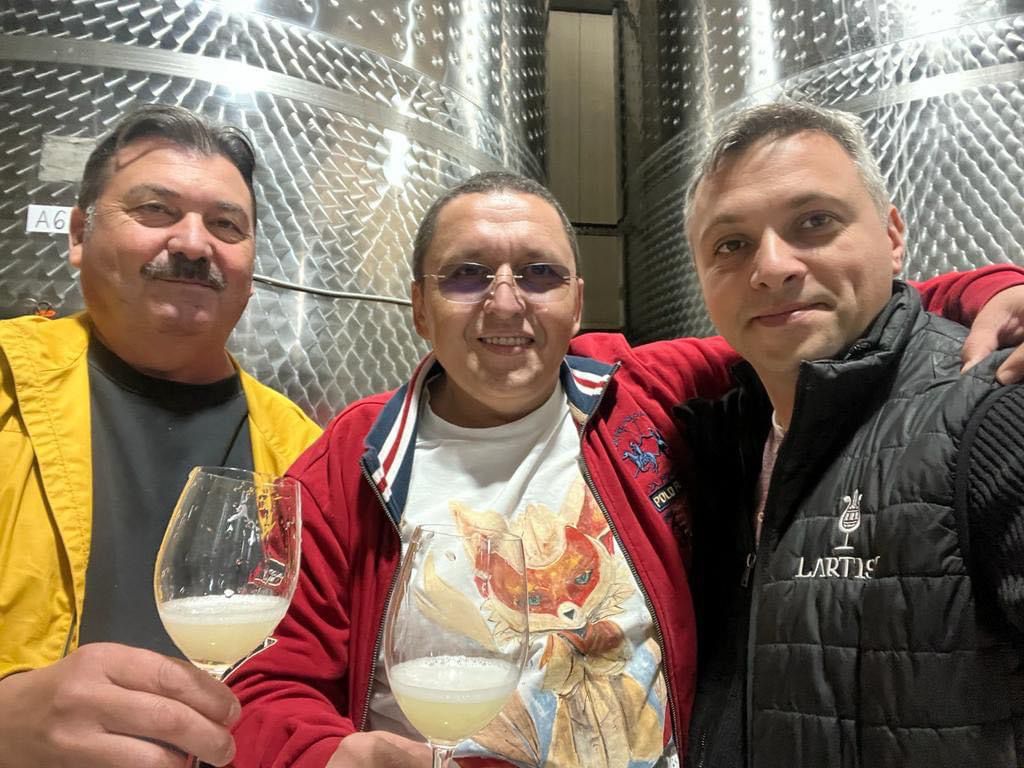
At Gramofon Wine, Feteasca neagra would also be good as Amarone style
WoR: And you became a winegrower, after a life of music and almost nothing to do with agriculture…
M.P.: About that. From my childhood, I only remembered weeding, going with a sled, riding in a carriage or a trailer, the stables where I was playing between the horses’ legs, Pavel, the white blind horse that was carrying the sulky and led by harness… And now I was suddenly a winegrower, but we started making the wines, ever since 2015, with a sense of responsibility and they came out quite appreciated, then the 2016 Feteasca neagra came along, which was an accident, someone didn’t come to harvest their grapes, and they accumulated a lot of sugar… When I presented it to the public for the first time, at a wine show in Bucharest, I divided the audience into two: some who said that I had returned to Ceausescu’s time, to semi-sweet and sweet wines, others who answered that it was not like that, it’s something else, a different manner… Those from the "hostile" side were sure that we were adding sugar to the wine, while we had analysis showing 330 grams of sugar, the most high level that the institute where we ran the analysis had ever measured until then. I think that Feteasca neagra lends itself very well to this type of wine, and even to the classic Amarone method, left to to dry out on shelves in silos, but I don’t have such spaces to experiment. And anyway, we Romanians have a bit of a psychosis when it comes to sweet wine, almost everyone avoids it. I discovered an exceptional sweet wine the very first time I arrived in Italy, in Manduria – it was a Primitivo with 18% alcohol and still sweet.
WoR: Since you started producing wine, how has your personal relationship with wine changed?
M.P.: Obviously a lot has changed. I started to understand it, I wanted to discover it, to understand the market, to find out the public taste and trends, I discovered the varieties and their expressions… I read a lot, I did a lot of research, I asked a lot of questions
WoR: And socially?
M.P.: Socially, wine brings us closer. It unties tongues and leads to beautiful friendships. People ask me if I don’t get angry, now that I work in the vineyard and make wine, when we have to host a party in the middle of the campaign. I tell them that on the contrary, the best time for a party is when the grapes are being picked. There are regions in the world that have official holidays for this, entire harvest festivals! Since I was a child, even if it was just a small, home-grown vineyard, at harvest time the grills were fired up, friends gathered, there was a joyful, incredible atmosphere, especially if the harvest was good. Yes, it is stressful to keep an eye on the presses, on the vessels, but the joy of being among people is incomparable.
WoR: Wine has grown enormously in the last decades, all over the world, even if it was felt just recently in Romania. How did the music evolve during this time?
M.P.: The commercial music has been simplified, clearly. But quality music continued to evolve, especially through the quality of instruments and recordings, but also through the evolution of playback equipment. And here, music starts to resemble wine – behind every song you listen to, there are dozens of people and hundreds or thousands of hours of work and experience. The same is true about what happened behind the scene, when it comes to a bottle of wine.


